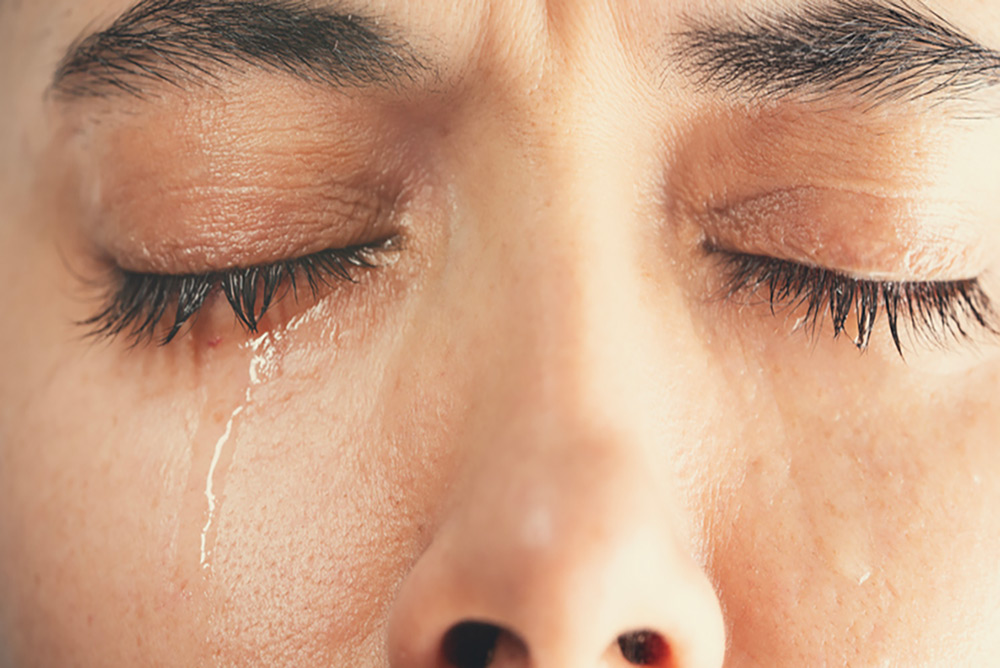
iStock
By Mary Carpenter
WITH AN upcoming wedding or funeral, I start worrying weeks ahead—about crying, sobbing tears that can arise for me with anything from emergency sirens (courageous rescuers) to movie theater ads (cars on lonely roads). But my lacrimal flow is at its worst at ceremonies, where common tips are useless: an ice cube in the hand or cold water to splash on the face are never available; and counting backwards or mentally reciting a poem, song or nursery rhyme—or even a mantra such as “I am a happy person”— takes too much attention away from the ceremony: I don’t want to miss it entirely.
Distractions that work better are “grounding” techniques, such as pinching yourself hard anywhere, or at acupressure points such as between the index finger and thumb; making a tight fist; fidgeting; and pushing the tongue against the top of the mouth. According to the dentistry site RDH, “the tongue’s position against the hard palate affects the parasympathetic system” —which reduces heart and respiratory rates to create calm as well as distraction.
“Emotional tears” may have evolved in humans to help us bond, according to Healthline. In contrast to basal tears that clean and lubricate the eyes, and reflex tears caused by irritants, like the compounds in onions or pollen— “emotional tears have more proteins, which makes them more viscous and more likely to stick to the skin and roll slowly down your face for other people to notice.”
And “crying causes your body to release oxytocin— the ‘love’ chemical you feel when you’re hugging someone,” writes Lauren Valko on the site HighlySenstiverRefuge. Quoting Harvard Health, Valko notes that endorphins also released along with tears are “the happiness hormone… actually a mild, natural opioid. In other words: crying actually helps fix those negative emotions.”
Anything that alters hormones—sleep, stress, medications—can affect how much you cry, according to Healthline. Testosterone may inhibit crying, “while prolactin that is higher in women may promote crying.” Women cry more often than men, although the numbers can vary from three to six times as often; and Americans—both men and women— cry more times per month than the global averages. Finally, temperament may affect crying behavior in both sexes —with extroverts more comfortable about their tears.
Another statistic —surprising, but helpful to anyone worried about inappropriate tears—is that one in 20 people cry every day at work, writes Valko. In addition, she describes “Highly Sensitive People” (HSP), a category that may include as many as one in three people who “feel and process…surroundings more deeply than non-HSPs [and] absorb emotions from those around them…makes us incredibly empathetic.”
While the category of HSPs is unofficial, researchers have used functional MRIs to examine brain activity in HSPs compared with that of other participants. When asked to look at photos of their partners and of strangers making happy or sad expressions, HSPs had more brain activation in areas associated with empathy and awareness; and in those involved with attention and taking action.
Crying can have benefits, notably relieving stress and removing chemicals that build up during stress. And, as in “getting it out of your system,” crying can release old hurts and prevent new ones from getting buried. Also, crying can provide useful feedback: “tearing up frequently could mean that something in your life needs attention,” according to PsychCentral. Common recommendations include taking up journaling, getting more sleep and noticing where crying happens most often: if around a family member, try drawing better boundaries; if at work, “perhaps it’s a sign to move on to another opportunity.”
“Helplessness and powerlessness” comprise one consistent trigger for adult crying—the other being “separation and loss,” Dutch clinical psychologist Ad Vingerhoets told the New York Times. But, the article advises, “if you think your emotions are regularly getting the best of you, chat with your doctor about it just in case—an underlying condition like depression or anxiety could be causing you to cry a lot.”
Besides depression, what can cause someone to feel worse after crying is experiencing shame as they cry, or trying to suppress tears, according to researchers at the University of South Florida in Tampa. Of two mental health diagnoses related to unstoppable tears, one is prolonged grief disorder, which involves unexpected crying outbursts that continue for a long time after a loss and become more intense and persistent over time; and the other is adjustment disorder, which causes exceptional difficulty coping with significant adverse events.
“Sudden uncontrollable emotional reactions, with or without crying outbursts,” may in rare cases indicate a condition called pseudobulbar affect (PBA), according to VeryWellHealth. Occurring most often in connection with head trauma, stroke and neurological diseases, such as Parkinson’s, the exaggerated emotions of PBA don’t match feelings or situations at the time, for example, crying during a funny movie; or laughing that suddenly turns to crying.
In preparation for an upcoming funeral, I am trying to concentrate on the benefits of crying, also on feeling less embarrassed by overabundant tears. But as I remember the failures of techniques tried at past ceremonies, I am also assembling my fallback aids—beta blockers and handkerchiefs, which I have in large supply.
—Mary Carpenter regularly reports on topical subjects in health and medicine.

Thank you. This is an important topic that we don’t talk about enough.